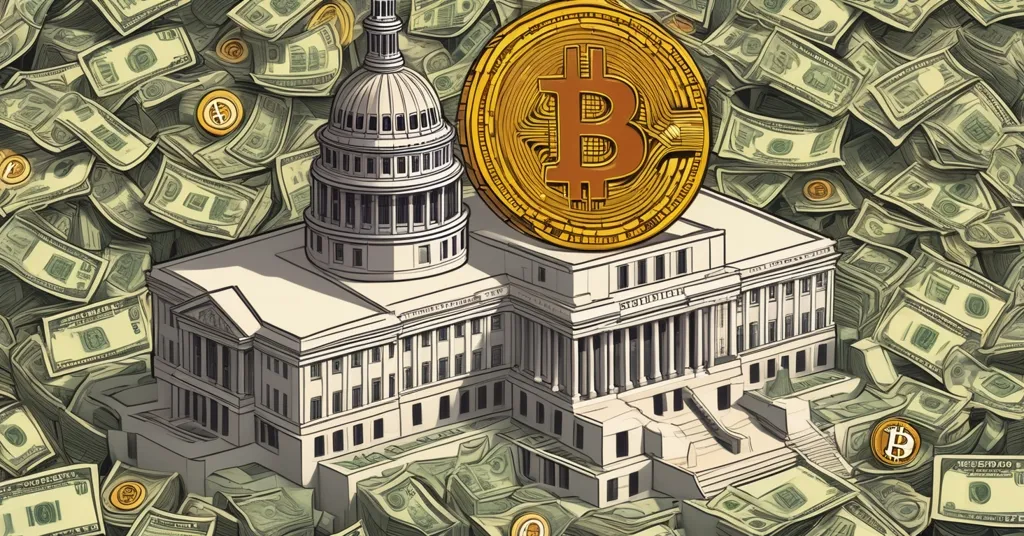Texas Senate Bill 21 Nears Passage: State-Managed Bitcoin Reserve on Horizon

Texas Senate Bill 21 Advances: A Step Closer to State-Managed Bitcoin Reserve
Is Texas about to take a giant leap into the future of finance? Senate Bill 21, which aims to create a state-managed Bitcoin reserve, is one step away from becoming law.
- Texas House to conduct second reading of SB 21 on May 20th
- Bill aims to create a state-managed Bitcoin reserve
- Legislative session ends soon, adding urgency to the bill’s passage
In the heart of the Lone Star State, a significant legislative move is unfolding that could reshape how Texas manages its financial assets. Senate Bill 21 (SB 21), poised to establish a state-managed Bitcoin reserve, is gearing up for its second reading in the Texas House of Representatives on May 20th. With the legislative session set to adjourn in less than two weeks, the clock is ticking on this pioneering piece of legislation.
Senate Bill 21 represents a bold move towards integrating Bitcoin into state financial reserves, reflecting a growing trend across the US. Authored by Senator Charles Schwertner and sponsored in the House by Representative Giovanni Capriglione, this bill isn’t just about dabbling in digital currencies; it’s about treating Bitcoin as a strategic financial asset—a type of investment that helps the state manage and protect its money over time—to hedge against inflation and bolster economic resilience. If passed, Texas would join the ranks of New Hampshire and Arizona as the third US state to establish a formal Bitcoin reserve.
The journey of SB 21 has been marked by strong support and decisive votes. It passed the Texas Senate with a 25–5 vote on March 6, followed by a 9–4 vote in the House Committee on May 7. The bill’s momentum reflects a growing recognition of Bitcoin’s potential as a financial tool amidst global economic uncertainty.
With the bill’s progress, the question of how to fund the reserve becomes crucial. Funding for the proposed reserve would come from a variety of sources, including legislative appropriations, investment earnings, voluntary donations from Texas residents, and any Bitcoin or crypto assets received through forks or airdrops. (Forks refer to changes or upgrades in the blockchain that can result in new cryptocurrencies, while airdrops are free token distributions to existing cryptocurrency holders.) To be eligible for inclusion in the reserve, digital assets must meet a stringent criterion: a minimum market capitalization of $500 billion over the past 12 months, a threshold currently met only by Bitcoin.
Dennis Porter, co-founder and CEO of the Satoshi Action Fund, underscores the importance of the upcoming second reading, stating,
“The second reading is ‘the necessary step’ before a final vote.”
His organization has been instrumental in advocating for Bitcoin-friendly policies across the nation, and Texas’ potential adoption of SB 21 is seen as a continuation of this trend.
The push for state-managed Bitcoin reserves isn’t isolated to Texas. New Hampshire made history on May 6 by passing House Bill 302 (HB 302), establishing the first strategic Bitcoin reserve in the US. Arizona swiftly followed suit on May 8 with House Bill 2749, marking a new era of state treasury diversification.
As Texas stands on the brink of this legislative milestone, the implications extend beyond the state’s borders. A successful passage of SB 21 could signal a broader shift in how states view and manage their financial reserves, embracing digital assets as a means to future-proof their economies. Yet, the tight legislative timeline adds a layer of complexity and urgency to the bill’s journey.
In a world where economic volatility is the norm, the idea of states leveraging Bitcoin as a hedge against inflation might seem radical to some. Yet, for proponents like Schwertner and Capriglione, it’s a necessary evolution in financial strategy. As Texas navigates this path, the eyes of the nation—and perhaps the world—are watching closely.
While the optimism surrounding Bitcoin’s potential is palpable, critics argue that the volatility and regulatory uncertainties of cryptocurrencies pose significant risks. Balancing these perspectives is crucial as Texas weighs the benefits and challenges of establishing a state-managed Bitcoin reserve.
Both New Hampshire and Arizona have mandated that any Bitcoin or digital assets held in their reserves must be kept in U.S.-regulated custody, either through state-controlled multisig wallets, qualified custodians, or U.S. exchange-traded products. This focus on security and transparency is a vital consideration for Texas as well.
The broader impact of these state-level initiatives could spark a national wave of Bitcoin adoption at the state treasury level, potentially influencing federal policies and the broader acceptance of cryptocurrencies. The economic implications, such as potential impacts on inflation hedging and financial resilience, underscore the strategic motivations behind these legislative moves.
In Texas, everything is bigger—including their plans for a state-managed Bitcoin reserve. Is Texas setting a dangerous precedent, or is it a visionary move that other states will soon follow?
Key Takeaways
What is Senate Bill 21 in Texas?
Senate Bill 21 (SB 21) aims to establish a state-managed Bitcoin reserve in Texas, allowing the state to buy, hold, and manage Bitcoin as a strategic financial asset.
What are the key steps required for SB 21 to become law in Texas?
SB 21 needs to pass its second reading in the Texas House of Representatives, followed by a third reading and final floor vote. If passed, it will then go to the governor for signature.
Who are the key figures behind SB 21 in Texas?
Senator Charles Schwertner authored the bill, and Representative Giovanni Capriglione sponsored it in the House.
How does Texas plan to fund its proposed Bitcoin reserve?
The reserve would be funded through legislative appropriations, investment earnings, voluntary donations from Texas residents, and any Bitcoin or crypto assets received via forks or airdrops.
What criteria must digital assets meet to be included in the Texas Bitcoin reserve?
Digital assets must have maintained a market capitalization of at least $500 billion over the past 12 months, a threshold met only by Bitcoin.
Which other US states have established Bitcoin reserves?
New Hampshire and Arizona have established formal Bitcoin reserves.
What is the significance of New Hampshire’s House Bill 302?
House Bill 302 made New Hampshire the first US state to create a strategic Bitcoin reserve.



